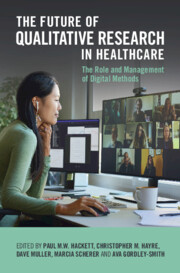Book contents
- The Future of Qualitative Research in Healthcare
- The Future of Qualitative Research in Healthcare
- Copyright page
- Dedication
- Contents
- Figures
- Tables
- Contributors
- Acknowledgements
- Chapter 1 Introduction to Digital Platforms and Digital Research Approaches, Encryption, Cybersecurity and Bandwidth
- Chapter 2 Doing Digital Qualitative Research
- Chapter 3 Using Video Diaries for Remote Observational Research
- Chapter 4 (In)Equitable Shifts
- Chapter 5 “To Be or Not to Be?” Qualitative Research upon and during a Pandemic Outbreak
- Chapter 6 Adopting Digital Methods
- Chapter 7 Lessons Learned Conducting Online Qualitative Interviews during Covid-19
- Chapter 8 Virtual Interviewing in the Age of Covid-19
- Chapter 9 Minimizing the Impact Technology Has on Interviewer–Interviewee Rapport
- Chapter 10 Participatory and Invasive Online Worlds
- Chapter 11 Using Online Survey Tools to Improve Access to International Experts
- Chapter 12 Refining Interview Protocols for Online Interviews on the Employment of Persons with Down Syndrome
- Chapter 13 Technology-Aided Programs to Support Leisure, Communication, and Daily Activities in People with Intellectual and Multiple Disabilities
- Chapter 14 Virtual Qualitative Data Collection
- Afterword
- Index
Afterword
Published online by Cambridge University Press: 14 November 2024
- The Future of Qualitative Research in Healthcare
- The Future of Qualitative Research in Healthcare
- Copyright page
- Dedication
- Contents
- Figures
- Tables
- Contributors
- Acknowledgements
- Chapter 1 Introduction to Digital Platforms and Digital Research Approaches, Encryption, Cybersecurity and Bandwidth
- Chapter 2 Doing Digital Qualitative Research
- Chapter 3 Using Video Diaries for Remote Observational Research
- Chapter 4 (In)Equitable Shifts
- Chapter 5 “To Be or Not to Be?” Qualitative Research upon and during a Pandemic Outbreak
- Chapter 6 Adopting Digital Methods
- Chapter 7 Lessons Learned Conducting Online Qualitative Interviews during Covid-19
- Chapter 8 Virtual Interviewing in the Age of Covid-19
- Chapter 9 Minimizing the Impact Technology Has on Interviewer–Interviewee Rapport
- Chapter 10 Participatory and Invasive Online Worlds
- Chapter 11 Using Online Survey Tools to Improve Access to International Experts
- Chapter 12 Refining Interview Protocols for Online Interviews on the Employment of Persons with Down Syndrome
- Chapter 13 Technology-Aided Programs to Support Leisure, Communication, and Daily Activities in People with Intellectual and Multiple Disabilities
- Chapter 14 Virtual Qualitative Data Collection
- Afterword
- Index
Summary
With the advent of COVID-19, adaptation became a norm. Research data-collection methods similarly required adaptation, birthing the use of virtual platforms as first-line data collection tools to adhere to COVID-19 restrictions. This chapter presents an autoethnographic account of virtual qualitative data collection. A PhD candidate shares her experience of conducting individual and focus group interviews virtually in a developing nation. A discussion of the narrative and recommendations for virtual qualitative data collection are provided.
Keywords
- Type
- Chapter
- Information
- The Future of Qualitative Research in HealthcareThe Role and Management of Digital Methods, pp. 251 - 257Publisher: Cambridge University PressPrint publication year: 2024

